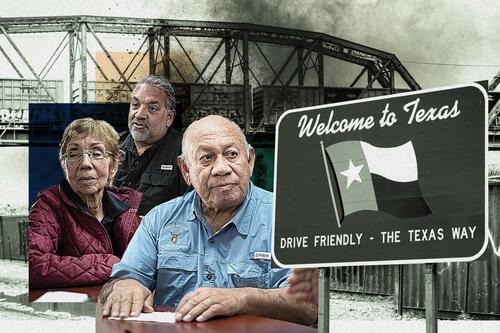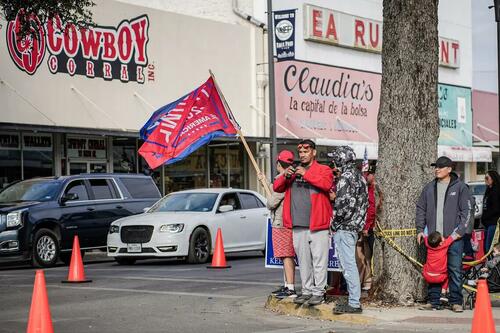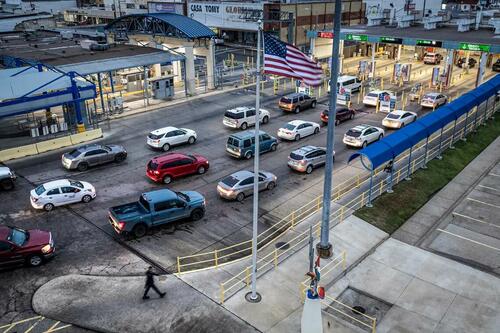Authored by Janice Hisle via The Epoch Times (emphasis ours),
Benny Rodriguez, an 80-year-old grandfather of seven, beams as he points to faded photographs on the wall and proudly narrates the story of Eagle Grocery, a family-run business since 1939.

It withstood a fire in 1948. It emerged from a flood in 1954. And since 2002, the 11,000-square-foot store has persevered in the shadow of a 218,000-square-foot Walmart Supercenter two miles away.
“We’ve been through a lot, but we’re still here, and we love it; we love our community, and that’s what keeps us going,” Mr. Rodriguez told The Epoch Times inside the grocery at Main and Adams Streets.
But there are new worries about a recurrent threat that Eagle Grocery, the Rodriguez family, and the local economy have faced over the years.
In attempting to halt illegal crossings, federal officials have sometimes blocked the flow of law-abiding Eagle Grocery shoppers by blocking the legal ports of entry across the border bridges from Mexico.
That has hurt this shop’s bottom line, but the problem isn’t local. American businesses in border towns from California to Texas suffer when legal ports of entry are blocked, often as a political show of force in response to a surge in illegal crossings.
Business owners like Mr. Rodriguez and officials in towns like Eagle Pass worry that government leaders might resort to this tactic more often to save face, even though its effectiveness is debatable, while illegal immigration remains the top concern for voters in the 2024 presidential race.
The last time the legal port of entry was blocked, the economy of Eagle Pass suffered a half-million-dollar loss in just a few weeks, its fire chief, Manuel Mello III, said.
“If this continues, we will have to place a freeze on hiring personnel, purchasing equipment, and completing projects for our citizens,” he testified to Congress during a January hearing on illegal immigration.
Similar unintended consequences are playing out in many U.S. border towns. And the collateral damage is rippling across America in ways that most people don’t realize, draining tens of thousands of jobs and billions of dollars in revenue.
Many Texans, including the Rodriguez clan, say this scenario provides more proof that many decision-makers are out of touch with the realities of life along the border. They hope for a fresh, commonsense antidote.

Beneficial Relationships
Mexico, the United States’ No. 1 trade partner, helped generate nearly $1 trillion in gross domestic product and at least 8 million jobs across America in 2023, according to a February report from The Perryman Group, a Texas-based firm that has analyzed U.S.–Mexico “Bordernomics” for many years.
“Trade, business relationships, workforce flows, and family ties link the 10 states along both sides of the U.S.–Mexico border,” benefiting both nations, a Perryman report points out.
The fate of Eagle Pass, Texas, is intertwined with its Mexican sister city, Piedras Negras—typifying such relationships all along both sides of the border.
“They depend on us; we depend on them,” Mr. Rodriguez said. “If they don’t come over here, and we don’t go over there, everything stops.”
In 2016, he served as Eagle Pass’s “Mr. Amigo,” an honor bestowed upon one resident of each city for the annual International Friendship Festival. But in March, the illegal immigration crisis displaced the joint celebration from its usual home in Shelby Park.
That 47-acre Eagle Pass park sits alongside the Rio Grande, the river separating the United States and Mexico. For months, it has remained closed amid a standoff between federal and state authorities who disagree over how to enforce immigration laws and control the U.S. border.
Texas Gov. Greg Abbott is among the many Republicans who accuse President Joe Biden of promoting open-border policies; Mr. Abbott emphasizes stringent enforcement of immigration laws and construction of border barriers. The White House has advocated “a fair, orderly, and humane immigration system” while calling on Congress to “make long overdue reforms to U.S. immigration laws.”
That clash—and unprecedented numbers of illegal immigrants—thrust Eagle Pass, a city of about 30,000 people, into the national spotlight late last year.
Often called “La Puerta de México,” Mexico’s Door, Eagle Pass serves as the fastest route from Mexico to major Texas cities.
A pair of international bridges, simply called Bridge One and Bridge Two, connect Eagle Pass and Piedras Negras.
In a typical month, some 300,000 vehicles and 40,000 pedestrians traverse those bridges legally, city data show.
But below those bridges, illegal crossings along the Rio Grande reached a record high last December. In that month Border Patrol agents in the Eagle Pass region apprehended more than 71,000 illegal immigrants; border-wide, arrests totaled 251,000, according to Customs and Border Protection (CBP) data.

‘It Makes No Sense’
These illegal immigrant surges are unpredictable. CBP has sometimes responded by shutting down bridges leading from Mexico to the United States.
As soon as the feds stopped passenger cars from crossing Bridge One in Eagle Pass on Nov. 27, 2023, “60 percent of our customer base was gone,” said Mr. Rodriguez’s wife, Angie.
Many Mexican nationals possess U.S.-issued cards permitting them to travel back and forth. They come into the United States to visit friends and family; they attend school, eat at restaurants, enjoy entertainment, and go shopping. Then they return to their homes in and near Piedras Negras.
These are the people whom the recent U.S. government border restrictions affected the most, the Rodriguez family’s eldest son, Jaime, 50, told The Epoch Times.
“So, you close the bridge to legal shoppers … to open the way for illegal people coming across under the bridge; it makes no sense,” Mr. Jaime Rodriguez said.
But that’s what happens “when you’re making decisions from Washington, D.C., without knowing the repercussions you’re having.”
The effects reverberate from Brownsville at Texas’s southernmost tip to the border’s end point in California, almost 2,000 miles away, he said.
Data supports his assertion. Last year’s border “inefficiencies” clogged the commerce pipeline, causing economic losses of $1.6 billion in the Texas border region, the Perryman Group calculated. Nearly 17,000 jobs were lost, about half of them in retail trade.
Cargo Chaos
Three weeks into the bridge shutdown, The Texas Border Coalition, which pushes for “secure, efficient borders that facilitate legitimate trade and travel,” appealed to the Biden administration for relief.
Read more here...